
Menstruating is a part of everyday (or should we say every-month?) life for women all over the world. But although nearly half the global population are female, a good portion don’t have access to sanitary products that help make that time of month so much more bearable.
Many young girls from low-income families are simply unable to buy what their better-off peers consider as basic essentials. As a result, they are missing significant amounts of schooling every month.
This concept may be associated with third-world countries, but in reality, it happens in pretty much every town and city in the world.
Amika George is a part of the movement to end so-called ‘period poverty’ with her #FreePeriods campaign. She began an online petition in April 2017 after she discovered children in the United Kingdom would miss school for up to a week each month while they menstruate because they were unable to afford sanitary products.
https://twitter.com/_priya02/status/949372665999044608
“I think that the existence of period poverty only came to public consciousness as recently as this [past] year, when reports of girls routinely missing school because they couldn’t afford menstrual products were thrust into the media glare,” said the 18-year-old activist speaking with Cherwell.
“What’s been depressing since then is the lack of any affirmative action by the government, despite outrage and horror that girls were often using socks stuffed with tissue, or newspaper.”
The petition addressed the UK government, reasoning with them to provide free sanitary protection to children who receive free school meals.
#FreePeriods in Parliament yesterday. We're on the way to ending #periodpoverty and we're going to do it! pic.twitter.com/BEf2vPFXNL
— Amika George (@AmikaGeorge) January 9, 2018
For many young women, their periods are a time of embarrassment, fear and shame. Their inability and unwillingness to attend school during this time cause a huge and damaging educational deficit.
George is not the only one championing for free period products. Bloody Good Period is a UK-based charity that supplies sanitary products to asylum seekers, refugees and other women who cannot afford them.
The charity was birthed out of a “whip-round” on founder Gabby Edlin’s Facebook to gather funds to buy pads and tampons to donate to food banks and asylum seeker drop-in centres in the UK. It has since turned into a “growing enterprise with a vision to end period poverty.”
Meet the woman fighting to end period poverty: @bloodygood__'s @doublebeewhy: https://t.co/HQeLVqRKMI pic.twitter.com/sdTwG5Z0PG
— British Vogue (@BritishVogue) January 24, 2018
The issue is certainly not restricted to the UK.
Over 1.2 billion women across the world do not have access to the basic sanitation, making their periods a monumental challenge every month.
In India, approximately 12 percent of its 355 million menstruating women cannot afford period products. Whereas in Kenya, an alarming 50 percent of school-age girls have no access to sanitary towels or tampons.
#Gwalior students to send 1000 sanitary napkins with message to PM Modi to make them GST-Free.
I have a feeling that post @PadManTheFilm , the Govt. will announce this waiver ! pic.twitter.com/jYDmp2BAst— Kumar Manish (@kumarmanish9) January 10, 2018
“Girls [in Kenya] are literally selling their bodies to get sanitary pads,” menstrual health researcher Dr Penelope Phillips-Howard told The Guardian.
“When we did our study in Kenya, one in ten of the 15-year-old girls told us that they had engaged in sex in order to get money to buy pads. These girls have no money, no power. This is just their only option.”
Another waste of a life as a result of archaic and culturally-entrenched superstitions around the 'impurity' of menstruation. As a new law comes into effect in August to outlaw the tradition, let's hope these toxic beliefs change too. https://t.co/S1XPXv0EEP
— Amika George (@AmikaGeorge) January 13, 2018
And Bloody Good Period aren’t the only ones in the UK making (red) waves in the world of menstruation. Freedom4Girls was set up by five University of Leeds students in to provide better sanitary care for women. Originally approaching schools in Leeds, the charity now provides regular sanitary aid for young women in Kenya.
On the other side of the world in the United States, students at the University of Florida recently held a “bleed-in” demonstration. They doused the crotches of their clothes in fake blood to protest a lack of free menstrual products in US universities.
“We need to dispel the culture of shame and embarrassment that we inherit from a young age about our periods,” said George speaking with Cherwell. “And we need to work together to embrace them, to celebrate how ridiculously powerful our bodies are.
“Education is key and will underpin any shift in perception on periods – the curriculum needs to change and schools must talk about periods with girls and boys must be part of that, too.”
The battle to normalise periods is slowly but surely creeping into the mainstream. In February 2018 an Indian film named Pad Man is set to be released. The film is a biographical story detailing the life of Arunachalam Muruganantham, a social activist from Tamil Nadu who revolutionised the manufacturing of sanitary pads for women.
Here’s to running towards a better future, together!
A glimpse of #PadManInDelhi University tax-free sanitary pad marathonMeet our #PadMan this 9th February, in a cinema near you!@akshaykumar @sonamakapoor @radhika_apte @mrsfunnybones @SonyPicsIndia @kriarj #RBalki pic.twitter.com/4A8XO0jTgD
— Pad Man (@PadManTheFilm) January 24, 2018
And it’s not just Pad Man here to save the day. Positive change is occurring in the West as well. A soon-to-be-aired advert for sanitary towels featuring red blood rather than a blue liquid or gel is on its way.
Challenging the stigma young female students feel attached to their period is just one small part of the problem, but every small step is working towards bettering the education of these girls.
According to Cherwell, last year was the first time “period” was said in a House of Parliament. While it may come as a shock, periods are often considered a taboo word in cultures around the world, and thus, had never been discussed before in Parliament. It goes to show the changes occurring due to the movement.
Meet the woman fighting to end period poverty: @bloodygood__'s @doublebeewhy: https://t.co/HQeLVr9lEg pic.twitter.com/DcEUP6BucL
— British Vogue (@BritishVogue) January 19, 2018
The battle to end period poverty is likely to be a lengthy one.
The issue is immeasurably widespread affecting millions of girls’ education worldwide. But baby steps by organisations such as Bloody Good Period and Freedom4Girls mean girls all over the world can take great leaps back into the classroom.
Liked this? Then you’ll love…
Breaking taboos: Talking about sexual health with international students
UK: Student social enterprise aims to tackle bullying in schools







